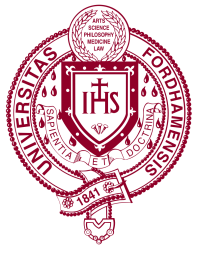Edited by Alex Finn-Atkins
Fordham alumnus Robert Molina served three years in the Marines before returning to his hometown of Bellmore, New York. The son of Bolivian immigrants, Robert enrolled as a first-generation student at Nassau Community College, where he earned his associate’s degree. Ready to tackle an ambitious course load, Robert transferred to Fordham University and graduated in 2018 with a major in Political Science and minors in Philosophy and Economics.
I first met Robert in Spring 2017 when he was applying for a Fulbright English Teaching Award to South Korea, a country he had visited while in the Marines. I remember Robert telling me how his experience abroad, like his immigrant family, opened his eyes to the treasures of inclusivity and cultural exchange.
Despite not receiving the Fulbright grant, Robert learned to write from personal experience and to seek continual feedback from advisors and trusted peers. Using these new skills, Robert then worked with Dr. Rebecca Stark Gendrano to develop a winning application to the Congressional Hispanic Caucus Institute (CHCI) Public Policy Fellowship, a nine-month program for young, aspiring policymakers.
This past month I caught up with Robert about his post-grad life as a CHCI Fellow in Washington, D.C. Below you’ll find our conversation, which has been edited and condensed.
How is the program going?
It’s been great. The first months of the program I was placed in the Office of the Comptroller of the Currency, U.S. Treasury. But now I am in the Office of Representative Kathleen Rice. Typically, CHCI fellows spend half their time in a congressional office on Capitol Hill and the second half in a placement more in line with their policy interest. Some fellows end up in federal agencies, others in national non-profits or advocacy organizations.
What drew you to Representative Rice’s office?
Well I was first interested in her work on the Homeland Security Committee. But then I also learned that her district includes my hometown.
So what does typical day look like for you in DC?
It really depends on my placement. Right now, in Representative Rice’s office, I assist with projects relating to her assignments on the Homeland Security and Veterans’ Affairs Committees.
What has been the most exciting part of the program?
I think probably the huge network of professionals I’ve been able to speak with. As fellows, we are not only placed into an intern role, but we are also introduced to many people tied to the Institute, like program alumni and other supporters of CHCI. They have all been very receptive to sitting down and discussing career aspirations and job openings.
Breaking into Capitol Hill can be so difficult, especially without knowing the right people or not being able to live in D.C. during your job search. But as a CHCI fellow, we can get a head start on this process.
And what challenges have you had to overcome?
One obstacle I had to overcome was the initial hesitation of reaching out to people, often via cold-calling. But I’ve learned that it’s acceptable to reach out to any staff member or alumni in the area that you want to connect with, like one time when I reached out for assistance with the second placement search and to discuss applying to law school. Most people I’ve tried to contract has been have been quick and willing to answer even small questions and are eager to share their experiences too.
Where do you see your career going in the future?
I plan to attend law school in the fall of 2019. I was recently accepted to Columbia Law School and interviewed with Harvard Law School last week. I should know where I’m going by April, but it’s just exciting to know I’ll be attending next year!
Wow. Congratulations! What about your undergraduate experience at Fordham do you think helped you prepare for these ambitious professional goals?
Attending Fordham provided me with so much accessibility because campus is so close to the city. The program managers at CHCI actually pointed at some of these opportunities like my internships with UBS and Sen. Gillibrand’s Manhattan office, as reasons for why I was selected for the program. I wouldn’t have been as competitive as a candidate for this fellowship without having attended a university in the city.
What advice would you give to other Fordham students thinking about applying to a prestigious fellowship?
Reviewing your application essays is very important, as it’s your one chance to provide new information that doesn’t appear in a resume or GPA. Applicants should try to show admissions committees ‘why now’ and why that particular program. For me, that meant writing about my connections to the Hispanic community and my commitment to public service, starting with my time in the military.
What else does the application process involve?
Many of these fellowship opportunities also require academic letters of recommendation, so fostering relationships with professors is really important. Whenever possible, take more than one course by a professor if you find their teaching styles interesting and then form a relationship with them. I had taken three political science courses taught by Dr. Cohen, who wrote my recommendation for CHCI, so we got to know each other very well.
Also, if any Fordham students or alumni need help with the CHCI fellowship application process, feel free to reach out! I had many people assist me with my fellowship applications, and I’d be happy to pay it forward. As a first-generation college student, I didn’t have a great understanding of the fellowship application process, and subsequently the law school application process, but there were plenty of people that helped along the way.




